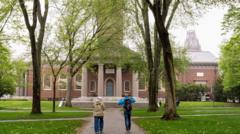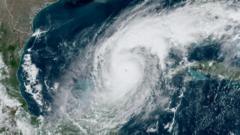In a significant escalation of tensions between the Trump administration and Harvard University, Homeland Security Secretary Kristi Noem announced the revocation of Harvard's "Student and Exchange Visitor Program" certification. This decision puts the university's ability to enroll international students at risk, a move the government claims is in response to violations of the law regarding admission and hiring practices. In her statement on X, Noem emphasized the seriousness of this action, calling on other universities to heed the government's warning, potentially setting a precedent for tighter scrutiny across the nation.
Trump Administration Revokes Harvard's International Student Enrollment Privileges

Trump Administration Revokes Harvard's International Student Enrollment Privileges
The Trump administration’s recent move against Harvard University raises concerns about the future of educational exchange programs.
Harvard University has vehemently contested the administration's decision, labeling it "unlawful." In a press release, university representatives expressed their commitment to international students, who currently comprise over 27% of its student population—approximately 7,000 students hailing from over 140 countries. They argue that this retaliatory measure could inflict severe damages on both the Harvard community and the broader educational landscape in the U.S.
The university has responded vigorously, asserting that it has proactively addressed issues of antisemitism on its campus and viewing the government's demands as efforts to interfere with its intellectual freedom and governance. As this contentious situation unfolds, its impact on the academic community remains uncertain and could set a consequential precedent for other institutions across the country.
As this story continues to develop, further updates are expected to illuminate the ramifications of this decision on Harvard and its international student population.
The university has responded vigorously, asserting that it has proactively addressed issues of antisemitism on its campus and viewing the government's demands as efforts to interfere with its intellectual freedom and governance. As this contentious situation unfolds, its impact on the academic community remains uncertain and could set a consequential precedent for other institutions across the country.
As this story continues to develop, further updates are expected to illuminate the ramifications of this decision on Harvard and its international student population.






















